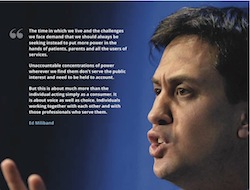The Co-operative Party launched its election manifesto last week, the culmination of two years work setting out plans for “an economy and society that puts people first, in which the rewards of economic success are shared by all”.
 ‘A Co-operative Agenda for Britain’ sets out the party’s agenda on a number of areas, including energy, transport, housing, education and public services.
‘A Co-operative Agenda for Britain’ sets out the party’s agenda on a number of areas, including energy, transport, housing, education and public services.
The party suggests building and shaping institutions that serve collective needs, and promoting a different way of doing business, with a strong emphasis on the mutual sector.
The party describes its “vision for Britain” as “an exciting one” where the historic co-operative values and principles are applied to the problems of today:
- An economy in which employees have the right to bid for the business they work for when it comes up for sale, and in which the profits are shared.
- Fixing broken markets in housing, banking and energy, putting the interests of the consumer before private profit.
- Changing public services to keep them rooted in communities and giving a voice to the people they serve.
- Ensuring that trade works for the world’s poorest, and that Britain leads the way to a low-carbon economy.
“Whether it’s a question of people coming together to take on the energy companies, the train operators, or even the payday lenders, co-operative and mutual organisations can provide a means through which people can collectively meet their aspirations and help change behaviour for the better,” says the document.
It proposes a number of legislative changes, such as creating a statutory duty on public bodies to foster a diversity of corporate forms and to report to Parliament annually on actions taken to promote mutuals, employee-owned firms, and family-owned enterprises.
The manifesto calls for a ‘John Lewis economy’ where employees can share the ownership, decision-making and profits of Britain’s businesses. But the party stresses that tax relief should only be offered to all-employee share ownership schemes, which require employees to purchase and hold shares for a number of years in order to benefit.
It also suggests an increase in the capacity of credit unions to offset the power of payday lenders; calls for not-for-profit rail operators guided by mutual principles; seeks a sharp growth in the number of co-operative homes; envisages legislation to enable all state schools to establish co-operative governance structures; and argues that football fans should have a right to minimal representation on club boards as well as ownership options when clubs change hands.
—
Or you can download a pdf version here.
More about the Co-operative Party can be found here.
See also: ‘Miliband Promises New Rights to Co-op Ownership’.


